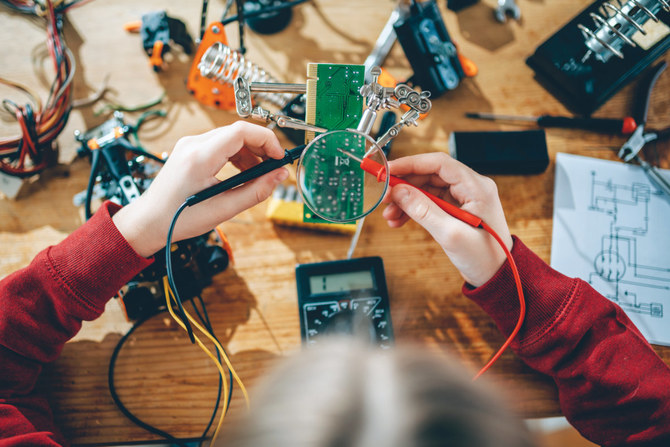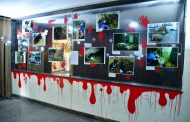Despite all the challenges the world has faced over the past year, King Abdulaziz and his Companions Foundation for Giftedness and Creativity (Mawhiba) were able to incubate 30 distinguished Saudi students to represent the Kingdom in the world’s largest scientific competition, Regeneron International Science and Engineering Exhibition (ISEF) 2021.
Kyiv. Ukraine. Ukraine Gate – June 18, 2021 – Forums and Conferences
The ISEF was actually held in the United States in May, and more than 1,800 students from 70 countries participated in it.
The science fair targeted innovative high school students who were invited to create science projects based on their research.
This year’s winners were announced May 20-21. The Kingdom was fortunate to get major prizes for the first four winners, who came in second, third, and fourth places. The awards varied, as some winners received cash and university scholarships, while major international and local companies adopted their other projects.
The winners were announced by the US jury, who based their decisions on elements including creativity, presentation skills, the ability to answer deep questions about projects, and trust.
Arab News spoke with the winners to find out more about their projects, inspirations, dreams, and more.
Saudi Arabia winners:
Mansour Al Marzouki, second place winner
Mansour Al Marzouki won second place on the International Grand Prize in Energy: Materials and Sustainable Design for his project “Advanced Synthesis of a Robust 3D Novel-Based Photovoltaic Capacitor of BiVO4 Hierarchy and Synthetic Carbon” – in other words: “Design of a self-charging supercapacitor”.
Using locally abundant elements including carbon from palm leaves and semiconductors such as bismuth and vanadium, Al Marzouqi’s project was inspired by renewable energy and has been endorsed by his professor from King Fahd University of Petroleum and Minerals.
“I made an energy-storage device, known as a supercapacitor, that could charge itself under only light exposure. However, I significantly increased the electrochemical performance of the device, which allowed it to function simultaneously as a battery, a capacitor, and a solar cell.
He added, “Winning in a competition like this was my dream. I felt a huge surge of happiness, gratitude, pride, achievement, and honor. Winning at the Regeneron ISEF is a very difficult criterion, especially because of the very intense competition.”
Al Marzouki hopes his invention will serve as a “virtue for society,” advancing knowledge and limiting energy demand.
The application of such projects is wide. Providing people with adequate energy is a difficult task, and my project is a great way to tackle this problem.”
He is looking forward to presenting the idea to distinguished institutions such as Saudi Aramco, the Ministry of Energy, NEOM, and the Saudi Electricity Company.
“I feel it is my duty to implement impactful projects like this here in my country,” he said.
Rasha Al-Qahtani, 3rd place winner
Rasha Al-Qahtani from Riyadh won third place in the field of social and behavioral sciences for her project “An Innovative Video Game Feature for Psychological Diagnosis of Generalized Anxiety Disorder in Adolescence.”
“I’ve created a new feature that can be applied to video games to help diagnose generalized anxiety disorder in adolescence by offering the player decisions to choose from while playing,” she said. “This approach is the first of its kind.”
Al-Qahtani praised Mawhiba and her parents for their support throughout her nine-year educational career and expressed how much she was honored with this achievement.
“I feel honored to have received this recognition for my research at one of the most challenging science fairs,” she added. “I am proud to represent my beloved country and prove that we symbolize what Crown Prince Mohammed bin Salman said when he said: “Our ambition is very high.”
Arwa Niazi, 4th place winner
Arwa Niazi, from Dhahran in the Eastern Province, has been part of talent since she was in the sixth grade. She received a 4th place award in the field of Materials Science for her project, “Future of a Self-Manufactured Supercharged Capacitor Using Laser-Assisted Autonomous Quantum Dots,” or simply, “Futures of a Sun-Responsive Super Capacitor Using Quantum Carbon Dots.”
“Several researchers have previously tried to create the device I worked on, but the problem was with the toxic materials applied,” she said. “But with my device, I’ve made it 100% eco-friendly.”
She added: “During the pandemic, Mawhiba has done a lot to help us participate in this competition. My school provided me with mentors, labs, and all the materials I need, and I am very happy to be proud of my country, my family, and my school.”
She expressed her happiness to be among the first four winners and how winning will determine her course in future studies.
“Winning is a great feeling,” she said, “and I’m proud that my hard work has paid off.”
Niazi’s application has been accepted into the University of Wisconsin-Madison, and she is currently waiting for a scholarship to support it. Consider joining the KAUST Talented Student Program or Saudi Aramco’s 10-month College Preparatory Program.
She is also thinking of being part of the first batch of female students to join King Fahd University of Petroleum and Minerals. The University in Dhahran, in a historic announcement, announced that it will start accepting female students for the first time in the 2021/2022 academic year. The university, which was established in 1963 by royal decree as the College of Petroleum and Minerals, is widely known for its strong programs in the fields of science, engineering, business, and management. It ranks fourth in the list of top 100 universities globally that granted US patent facilities in 2018.
Read Also: AL-Jouf Olive Festival in Saudi Arabia Celebrates the Blossoming of the Blessed Tree
Source: Ukrgate







